Skunks
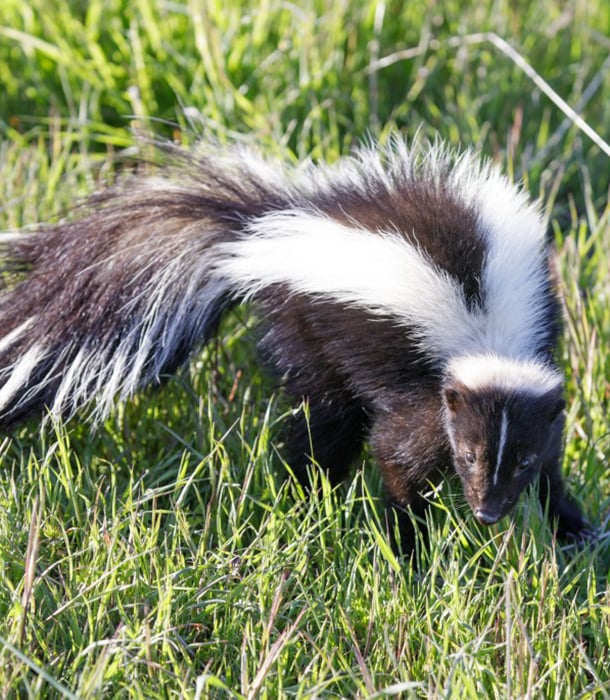
Dogs, cats, hamsters, goldfish. Ho hum. Everybody has those same, boring kinds of pets. You want something just a little bit different. But what, exactly? Something exotic? Something unusual? Something … dangerous? We don't recommend living with a kangaroo or a pack of wolves, but we've put together a list of 12 relatively easy to obtain and easy to care for pets that are just off the beaten path. They may challenge you with their slightly unusual needs (and in certain circumstances, they might not even be legal), but if you want something unique, these animals all are potentially good choices.
Skunks
Skunks are known chiefly for one thing — they stink. Or rather, they spray a stink on you as a defense mechanism if they feel threatened. That's why when we see a skunk shamble by, we give it a wide berth. But even while avoiding contact, we think, "Dang, that little fella sure is cute. I wish I could scoop him up and give him a hug and a pet."
Some people stop wishing and turn that fantasy into reality. Skunks are, in fact, often kept as pets, and they can make great companions. Of course, there are a lot of caveats involved. As you might imagine, skunk owners usually remove a pet skunk's scent glands at a young age to prevent it from stinking. However, many argue that this practice is unnecessarily cruel to the animals — plus, it is illegal in England. Furthermore, merely owning a pet skunk at all is illegal in most US states, so as always, research your local laws before pulling the trigger. But, assuming you're legally in the clear and have no moral objections to scent-gland removal (or you're just prepared to deal with the smell), an affectionate skunk may prove to be your ideal alternative pet, you animal-loving iconoclast, you.
Caribbean and Ecuadorian Hermit Crabs
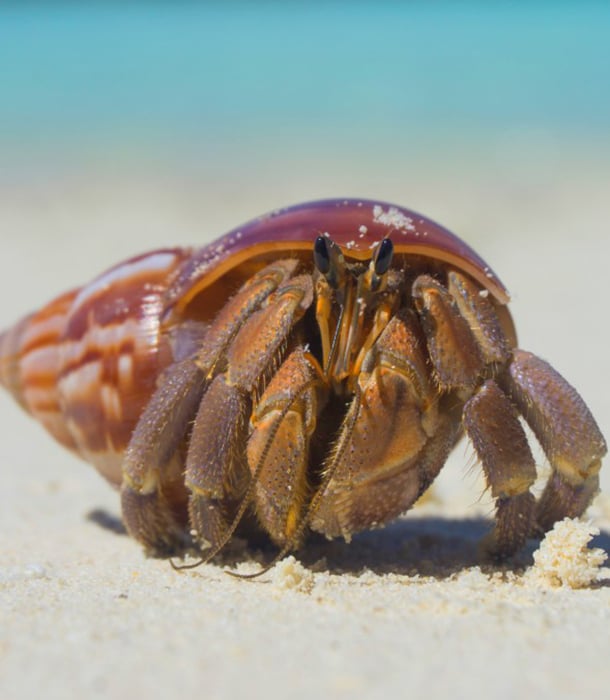
Hermit crabs have long been popular as a low-maintenance pet for kids who don't want to have a goldfish like everyone else at school. But you don't have to be a kid to own hermit crabs; you just have to be someone who wants a cool pet that's easy to care for and fun.
There are many different species of hermit crab on the planet, but the ones you'll find at the pet store are usually either Caribbean or Ecuadorian hermit crabs. It should be noted that the name "hermit crab" comes from the creatures' habit of living in shells that they find — used homes, if you will. They are not socially isolated animals. In fact, they do better in groups, and it's recommended that if you wish to keep a crab pet, you should have more than one. Fortunately, hermit crabs are small and cost an affordable $10–$15 each, so you can have yourself a crab family without breaking the bank.
And don't forget about the shells! As they grow, your hermit crabs will need to "move" into new and larger shells, and that's one of the most fun parts of crab ownership. There are all kinds of colorful and stylish shells out there for crab owners to buy. If you're the type of person whose favorite part about having a smartphone isn't the apps but buying different cases and external accessories to show off, you might dig hermit crabs.
Sugar Gliders
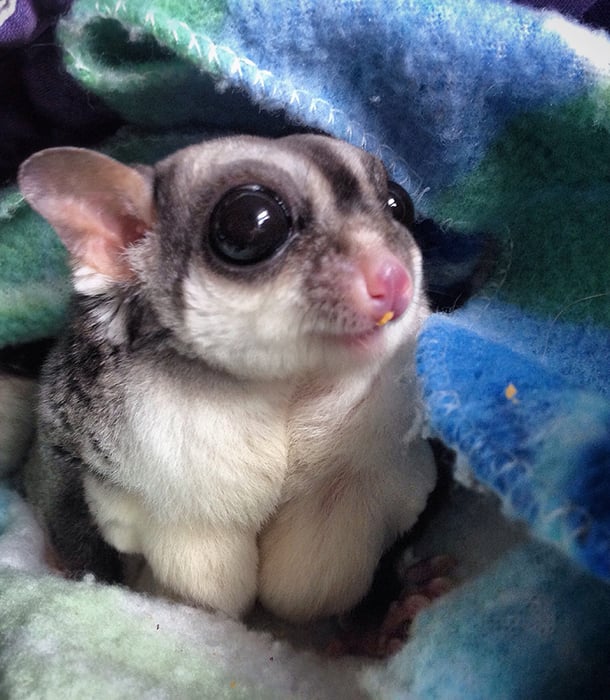
Sugar gliders are popular pets with some owners because they're super cute and relatively easy to care for. Technically a type of possum, these "flying" marsupials are similar in size to most pet rodents, but don't let that fool you into thinking they're quite as low maintenance as your typical hamster or gerbil. A sugar glider needs a larger cage in which to dwell, more toys and structures to keep it stimulated, and more attention and affection from you, its owner.
Be forewarned that sugar gliders carry with them a distinct odor — not as intense as that of a skunk's spray, but somewhat similar to a ferret. They're also known to be quite chatty, and since they're mostly nocturnal, that means they'll be up all night, making noise. And as with chinchillas, sugar gliders are social animals. Even unfettered affection from their human owners is not enough. All potential sugar glider owners are very strongly encouraged to adopt at least two of the creatures, so they have another of their own kind with which to interact.
Even with these caveats, there are some stalwart animal lovers for whom sugar gliders can make ideal exotic pets. (But as always, check your local laws to be sure you're legally allowed to have them in the first place.)
Chilean Rose-haired Tarantulas
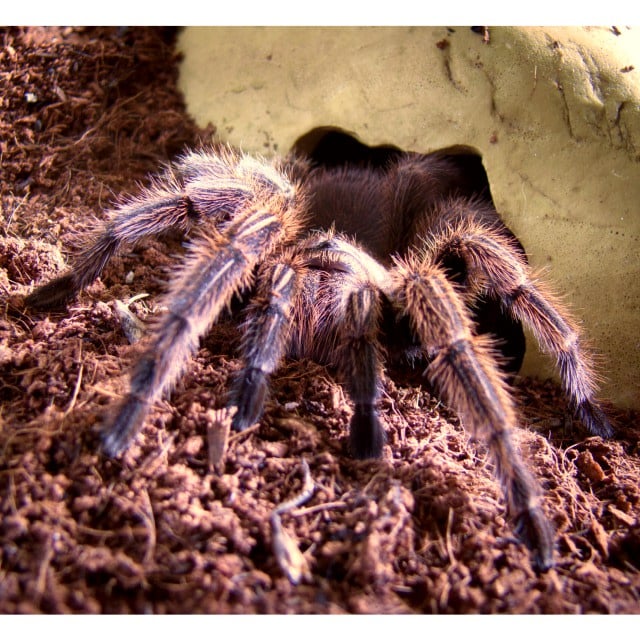
Tarantulas are pets that may send some people screaming from a room while thoroughly delighting others. There are many kinds from which to choose, but Chilean rose-haired tarantulas are the most popular species of their kind to be kept as pets. The reasons for this are because these tarantulas are, like emperor scorpions, both large and extremely cool-looking, yet very docile and easy to care for. A room-temp habitat and about one cricket per week will do your tarantula just fine.
Also like emperor scorpions, however, these tarantulas are best enjoyed without touching. They are skittish and don't like to be handled, so you're liable to get a dose of venom if you don't keep your hands away. Of course, if you're in the market for a pet tarantula, you're probably not expecting to adopt a snuggly cuddle buddy, anyway.
Chilean rose-haired tarantulas are quite hardy, and can easily live 15–20 years, so make sure you're aware of that commitment before you sign on the dotted line. If you want a long-term crawly pal, get yourself a female; they tend to have longer life spans than males.
Long-tailed Chinchillas
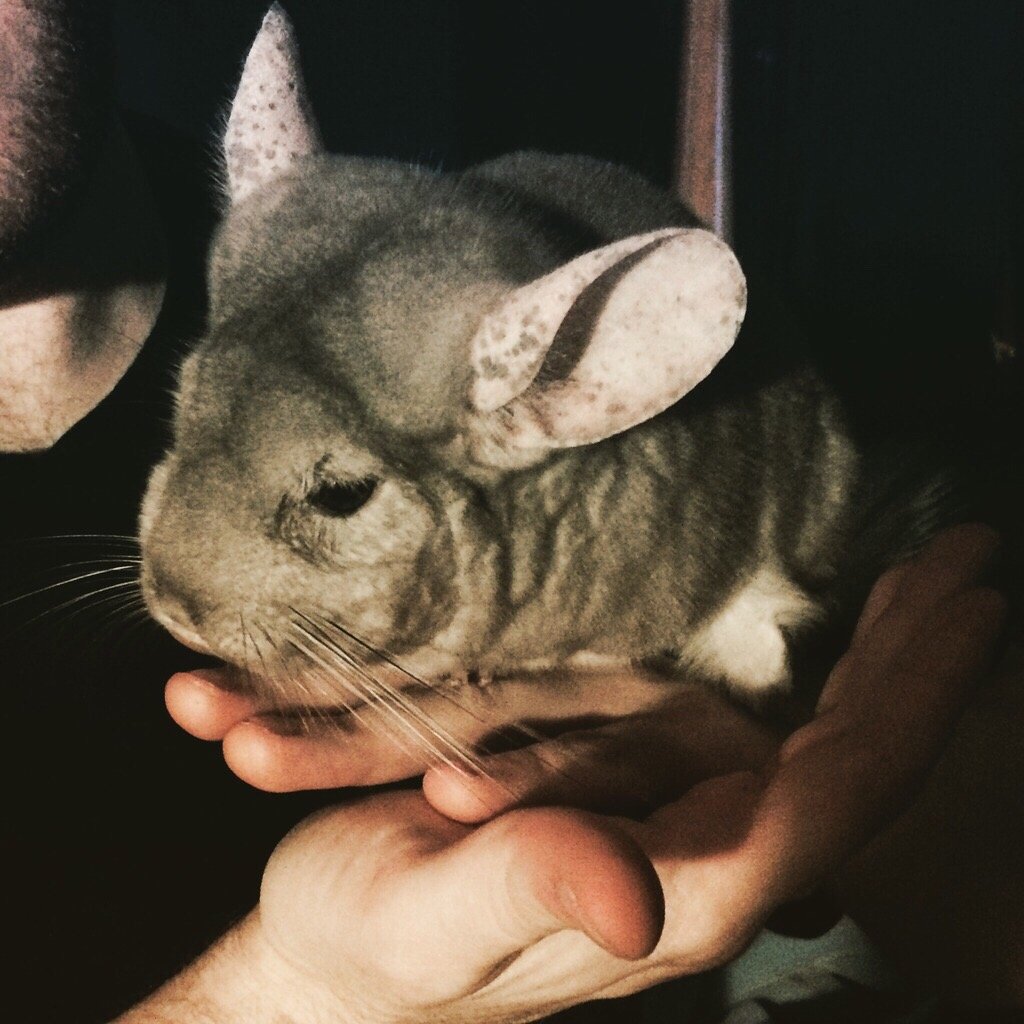
Chinchillas are unique, adorable and increasingly popular rodent pets. In the wild, these plump furballs are found exclusively high up in the Andes mountains in Chile, but they are commonly bred as pets. Once you touch a chinchilla and experience its indescribably soft fur and fun personality for yourself, it's inevitable that you'll start to consider chinchilla ownership.
Before you make the leap and bring home a chinchilla of your own, you need to know about their very specific care requirements. Chinchillas are active, and they like a lot of room to play and a lot of attention. It's a good idea to have two chinchillas instead of one, especially if you can't personally provide a lot of your own time for keeping your chinchilla company.
Chinchillas also require a special dust bath several times a week. Contrary to popular belief, getting a chinchilla wet will not kill it or cause its hair to fall out, but it is true that their dense fur will not air dry easily, so getting them wet is a bad idea. In the wild, they clean themselves by rolling around in dust formed from volcanic rock, but you can buy a commercial version. Depending on your perspective, this can be a fun part of owning a chinchilla, or a hassle to clean up after.
African Bullfrogs (aka Pixie Frogs)
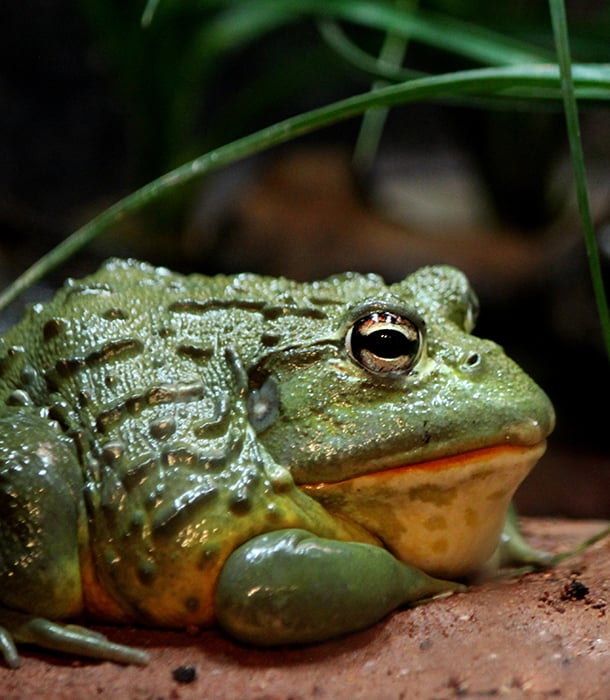
The stereotypical cartoon image of a frog depicts a small, green cutie catching flies with its tongue. But pixie frogs aren't typical frogs, and despite their nickname, they aren't small or cute. On the contrary, these beastly amphibians (the largest, found in South Africa) can grow to 9 inches and weigh more than 4 pounds.
Pixie frogs are aggressive, carnivorous and hungry. They possess sharp teeth and boundless appetites, so be prepared to provide plenty of food if you want to keep a pet pixie frog. In the wild, their prey includes mice and small birds, so feeding your frog some measly crickets won't do the trick. No, you'll need to buy feeder mice to keep your friend full. (Watch a video of a pet pixie frog eating a rat in one bite.)
As with snakes, the idea of keeping such a deadly animal as a pet and feeding it small, mammalian prey may make your skin crawl. But if you have a different personality, a pixie frog may be exactly what you're looking for. It certainly is a unique pet that probably not many of your friends have. You could be the first kid on your block who gets to feed mice to a frog.
Emperor Scorpions
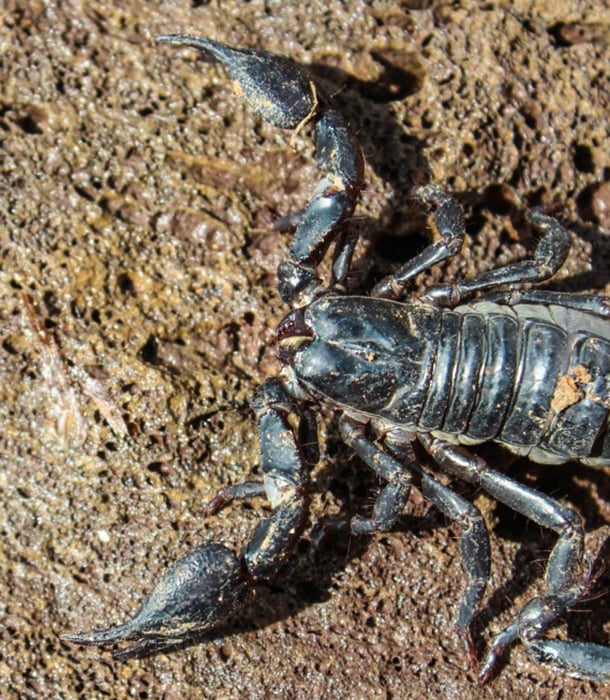
For folks of a certain disposition, pets that are creepy, crawly and intimidating-looking are attractive options as pets. Emperor scorpions make an excellent pet choice for a person of this sort. These natives of African rainforests are large for scorpions, one of the largest species of scorpion in the world, growing to approximately 8 inches. They're also shiny and black and have big, scary-looking pedipalps (front claws). Yet, despite their fearsome looks, emperor scorpions are quite docile, and while they do carry venom (as all scorpions do), theirs is quite mild.
Still, if you're someone who has to handle and play with your pet, an emperor scorpion isn't for you. You can't exactly snuggle with these bad boys. Even though their venom is relatively mild, it'll still hurt quite a bit if you happen to be stung — although, you're more likely to be pinched with those big claws if you agitate an emperor scorpion, which won't feel great either. And that mild venom could potentially send you into anaphylactic shock if you happen to be allergic to it, so caution is the name of the game here.
But let's be honest, the mild danger involved with with keeping a huge, scary scorpion as a pet is half the appeal!
Fancy Rats
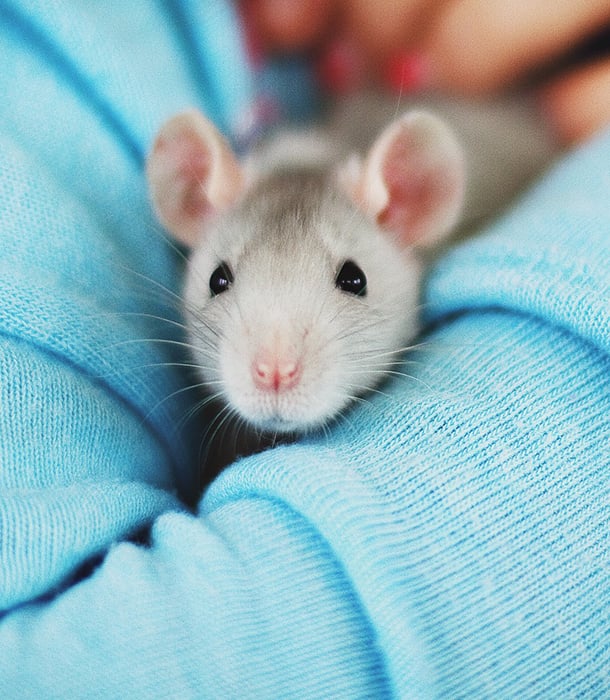
As with snakes, the idea of owning a rat is repellent to some (maybe even most) people. Humanity tends to regard the rat as one of the lowest, filthiest, most objectionable creatures on Earth. This is one of the greatest injustices in the world of pets. While we don't suggest you pick out a pet rat from the dumpster in the nearest alley, the domesticated rats (aka "fancy rats") you can obtain from a reputable breeder are among the most loyal and intelligent pets available.
The rat's high level of intelligence means that you can train yours just as well as you could train a dog. A rat will learn its name quickly, and can easily be taught any number of tricks. And as with dogs and cats, handling and petting your rat often (and properly) will only increase your bond. Fancy rats are well known for riding on their owners' shoulders and otherwise being close and affectionate.
Perhaps the greatest downside to rat ownership is their lifespan. Fancy rats have such wonderful personalities and may bond so closely with their humans that their relatively short lifespan of 2–3 years may mean too soon a goodbye for some owners.
African Pygmy Hedgehogs
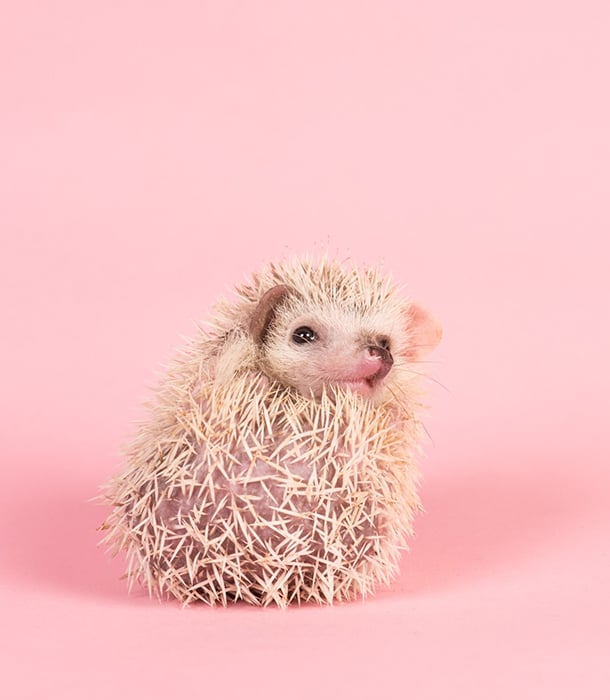
Pet hedgehogs are adorable and cute photos of them abound on the Internet. If you've fallen prey to the precious pics of these critters, chances are you've given some thought to the idea of adopting one as a pet. We don't blame you. Who could resist those cool spiny backs and soft, furry bellies?
While there are many different kinds of hedgehogs, the kind most commonly kept as a pet is the African pygmy hedgehog. Although they're relatively small, you'll want to set your hedgehog up in a cage normally sized for a slightly larger pet, like a guinea pig or a rabbit. Hedgehogs are active creatures and appreciate the extra room.
Hedgehogs are mostly nocturnal, so unless you're up and about at night, too, you may not get a ton of quality hangout time with your pet. But hedgehogs aren't dependent on a lot of attention anyway, so it won't be starved for affection. Handle your hedgehog often enough that it's used to you and comfortable with being handled, but not so much that it's overwhelmed.
It's also important to note that hedgehogs are illegal as pets in several states, so check your local laws. If it's legal, find a reputable breeder from whom to adopt. And take lots of pictures!
Leopard Geckos
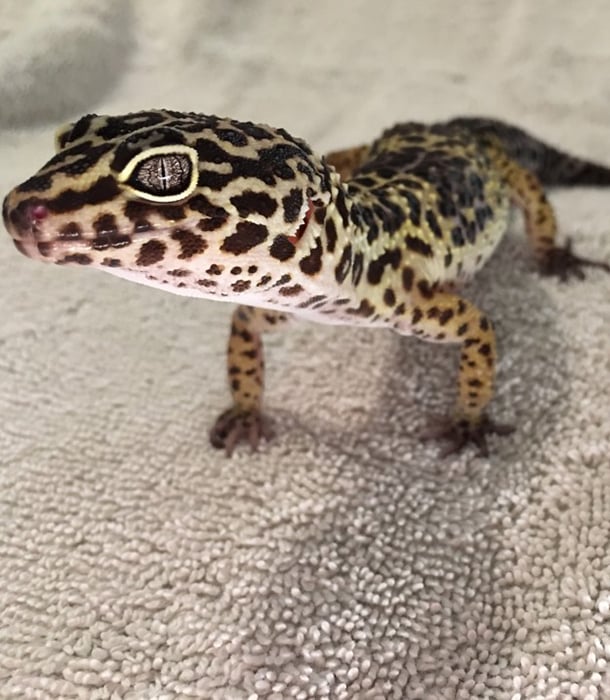
Gecko species are numerous and, while many are commonly kept as pets, perhaps the most popular is the leopard gecko. Native to Asia, these desert-dwelling lizards are easy to breed and thus are readily available for interested pet owners to adopt. Easy to care for, leopard geckos make a great choice as a starter pet for someone who is interested in keeping lizards as pets in general. Larger, more exotic lizards can be complicated and require a greater commitment, but leopard geckos require little more than suitable housing (warm and roomy), crickets to eat, water to drink and love (because everything thrives on love).
Some light handling is OK, but never pick up your gecko by its tail. Leopard geckos respond to predators and stress by "dropping" their tails (i.e., their tails fall off) as a defense mechanism. This can also happen simply from stress, or other factors. However, even if your gecko drops its tail, it's not the end of the world — or the tail. With proper treatment and care, a gecko can regrow a lost tail. How cool is that? Still, it's a situation always best avoided, if possible.
Bearded Dragons
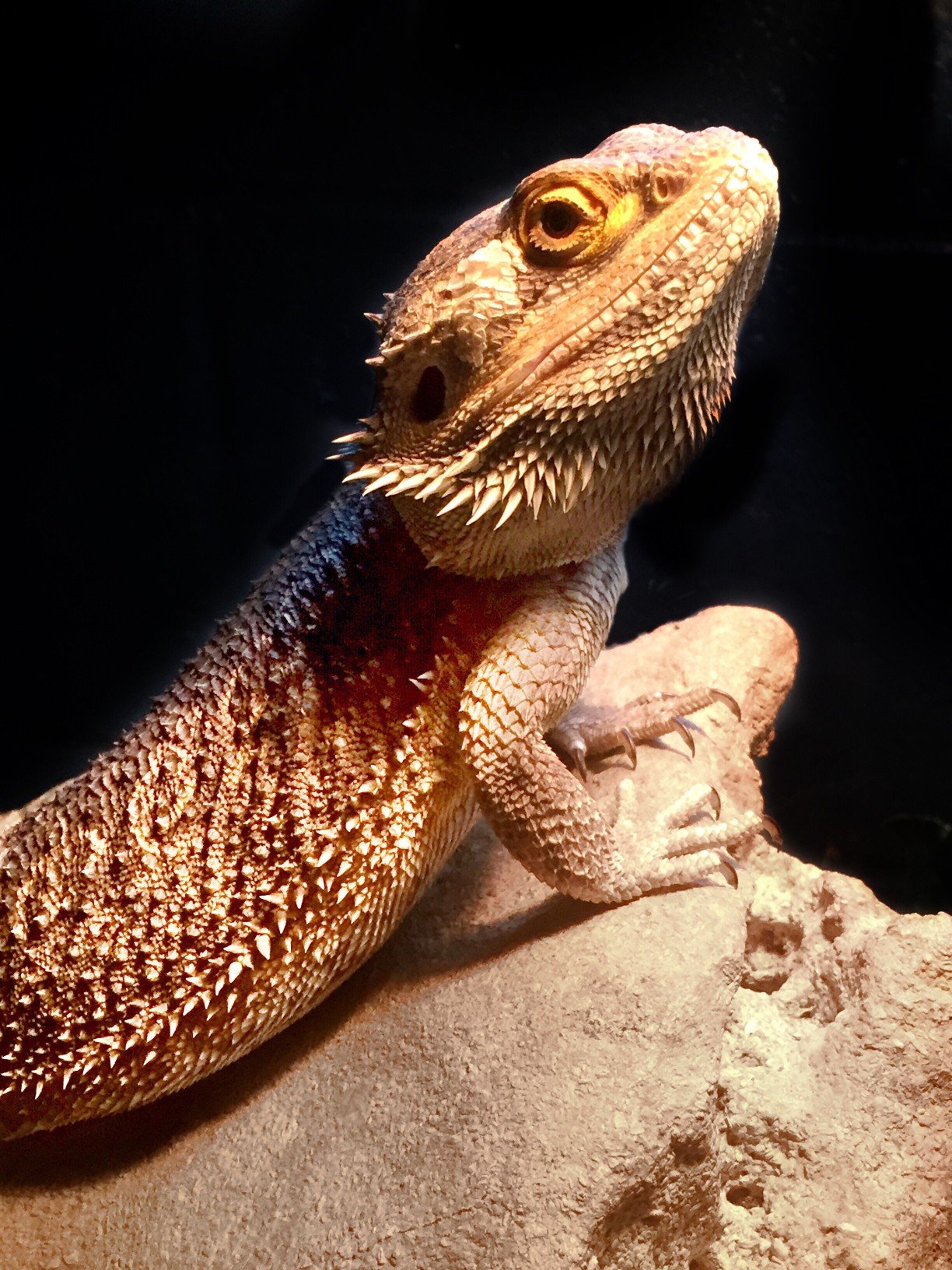
Whether you're interested in owning your first lizard, or you've got a child who wants an animal companion but is bored by the thought of adopting just another cat or dog, a bearded dragon could be your No. 1 ideal pet choice. Bearded dragons — aka "beardies" — are increasingly popular pets due to their easy care and their docile, agreeable nature. In fact, these lizards possess sparkling personalities and are surprisingly affectionate, so they're generally receptive to handling, and thus can make good pets even for younger kids. And no matter the age of the owner, these critters give a gift almost no other pet can boast — the cachet of being able to tell people that you have a dragon. (Wings not included.)
Corn Snakes
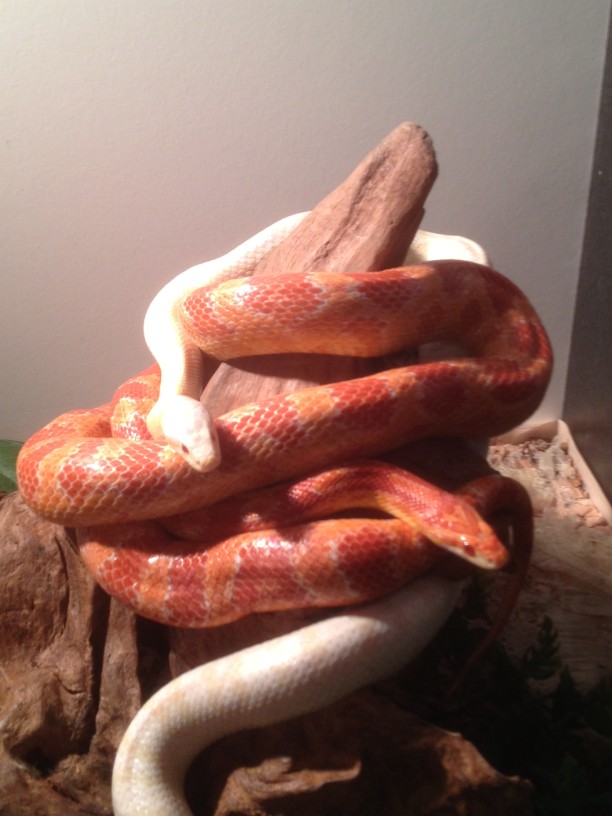
The image of snake ownership that many people may have in their minds is of large, intimidating boas and pythons whose owners feed them rabbits in their enormous enclosures. While that's certainly an option open to you, you don't need a pet requiring that much commitment if you want to be a snake owner. The much more manageable corn snake is one of the most popular kinds of snake kept as a pet.
A typical 20-gallon terrarium will do just fine for these crawlers, which grow to be only 4–6 feet long (uncoiled, of course). The most important parts of the shelter are a secure lid, so your snake doesn't escape, and that it is kept at 80-85 degrees Fahrenheit (because snakes are cold-blooded).
While you won't need to buy rabbits on a regular basis to feed your corn snake, you will need to buy feeder mice or rats. For some of you, that's a deal-breaker. For others, that's part of the fun of owning a pet snake in the first place.



